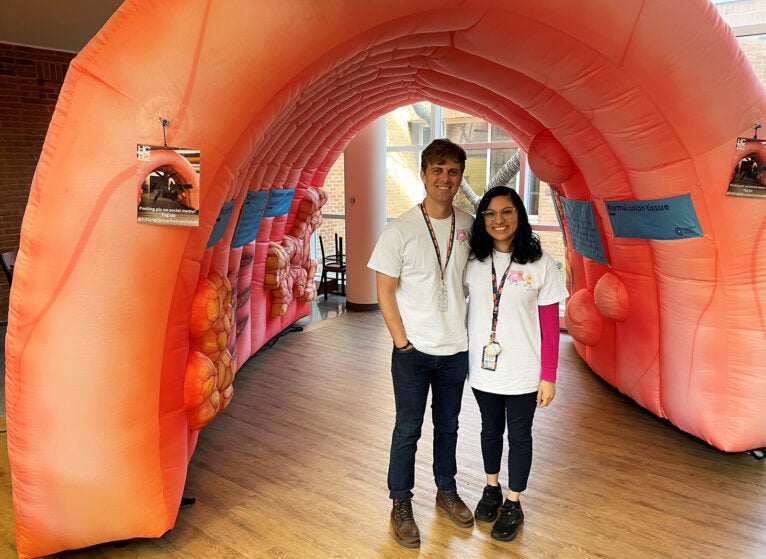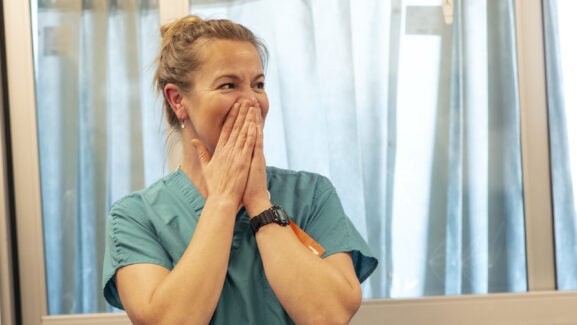

From left, Austin Matt-Beal and Keyri Lopez-Godoy.
Colorectal Cancer Awareness Month: Learn How UVA Health Team Members Support Community Engagement and Health Equity
The American Cancer Society (ACS) reports colorectal cancer (CRC) is the second most common cause of cancer death in the United States — and in 2023, there were more than 153,000 cases of CRC in this country.
Alarmingly, CRC is a growing concern among younger populations. As Lindsay Hauser, MS, MTTS, Director, Office of Community Outreach and Engagement (COE), UVA Cancer Center cites — CRC is now the number one cause of cancer death in men younger than 50, and the number two cause of cancer death among women younger than 50.
ACS also reports more than half of CRC cases and deaths are attributable to modifiable risk factors such as smoking, unhealthful diet, high alcohol consumption, physical inactivity, and excess body weight. And a large proportion of CRC incidence and mortality is preventable through regular screening, surveillance, and high quality treatment.
This Colorectal Cancer Awareness Month, Connect highlights how UVA Health team members at University Medical Associates (UMA) and the Cancer Center support our strategic plan goal of community engagement and health equity by raising awareness of the disease and the fecal immunochemical test (FIT), which uses antibodies to detect blood in the stool.
Passionate Focus
David Callender, MD, MPH, UMA Medical Director, is the project champion. “Over many decades, dedicated colorectal cancer screening initiatives coupled with modifiable risk factors and improved treatments have resulted in both early detection and improved survival,” he says. “Still, much work is needed for those between the ages of 45 and 50. We're passionately focusing our outreach and engagement on this age group. Our hope is that we can raise awareness, provide flexibility, and reduce barriers to screening.”
UMA’s Missy Warren, BSN, RN, AMB-BC, provides clinical escalation for non-clinical navigators Austin Matt-Beal, Keyri Lopez-Godoy, and Ashley Banegas at UVA Cancer Center’s Office of Community Outreach and Engagement (COE),
“It’s been rewarding to work on this project and see the positive results of our efforts,” Warren declares. “I’m very proud to be a part of this team that’s doing fabulous work in raising awareness and screening of colorectal cancer for our patients here at UMA.”
Get FIT
The COE team at the Cancer Center distributes and mails FIT kits. Each test takes a patient only a few minutes to complete at home. Two weeks after kits are mailed, navigators call patients to make sure they received them, and to ask if they encountered any barriers to completing the tests. If there’s no response within three to four weeks, a letter is mailed. Warren and Matt-Beal navigate non-Hispanic community members, while Lopez-Godoy and Banegas navigate Hispanic community members.
“We know and understand there are many life priorities,” says Lopez-Godoy. “In offering navigation, we hope we can facilitate the completion of their colorectal cancer screening by answering questions about the purpose of the exam; explaining how to complete the FIT; and connecting patients back with their care team if additional questions or needs arise during our phone encounters.”
A Gift — and Then Some
“I’ve seen the difference it makes when we take the time to discuss the purpose of the exam — walking through the steps of how to complete their FIT and checking for understanding before the end of our conversation. It’s been a gift being able to support our Hispanic patients in completing their screening.”
Bonus: “Making intentional connections with the Hispanic patients has led some to ask additional questions about other health needs, and seek to connect further with their care teams,” says Lopez-Godoy.“
Timely screening, starting at age 45, is critical to finding colorectal cancer early when it is most treatable,” Hauser reminds us. Learn more about your screening options.
Latest News



